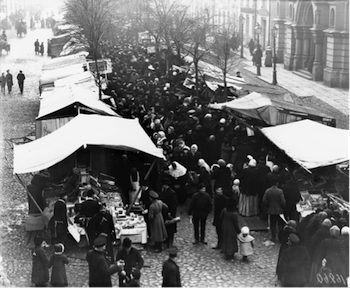This section covers the period of the New Economic Policy (NEP), from 1921 to 1928. We will be asking what were the achievements of the NEP? What did it do for the peasants? Was it a viable model of socialist development when the USSR was surrounded by hostile foreign powers? How far did it succeed in its cultural goals? Who was opposed to the NEP and why was it overturned by Stalin with the launching of the Five Year Plan? The section contains extracts from my books, photographs and videos, and a list of books to read. Register here to get information on accessing more materials including my responses to exam questions on these themes.

Market stalls, Moscow, early 1920s
The New Economic Policy was announced at the Tenth Party Congress in March 1921. It replaced food requisitioning with a relatively lenient tax in kind and legalized the return of small-scale private trade and manufacturing. Read more...
To many Bolsheviks the return of the market seemed like a betrayal of the Revolution. There was a widespread feeling that the NEP was sacrificing the workers' interests to the peasantry, which was growing rich at their expense, because of higher food prices. Read more...
Lenin believed that the key to the NEP was the development of rural cooperatives, through which the peasants could sell their produce at fixed rates of exchange for consumer goods, receive credit to purchase tools, and obtain agronomic aid. Read more...
'We Communists are people of a special brand,' Stalin said in 1924. 'We are made of better stuff.' Read more...
The NEP entailed a reprieve for the vestiges of 'bourgeois culture' which Communism promised to eliminate but could not yet do without. It brought a halt to the war against the professional middle class, whose expertise was needed by the Soviet economy. Read more...
The Bolsheviks saw education as the key to the creation of a socialist society. Through the schools and Communist youth leagues they aimed to indoctrinate the next generation in the new collective way of life. Read more...
Through the Pioneers Soviet children experienced a strong sense of social inclusion. Every child wanted to become a Pioneer. Read more...
How long would it take for the Soviet Union to industrialize through the mechanisms which the NEP allowed? Read more...
Here are some exam-like questions. Read more...
A recording of a lecture/class about these themes using primary documents. Read more...
A list of further reading. Read more...

